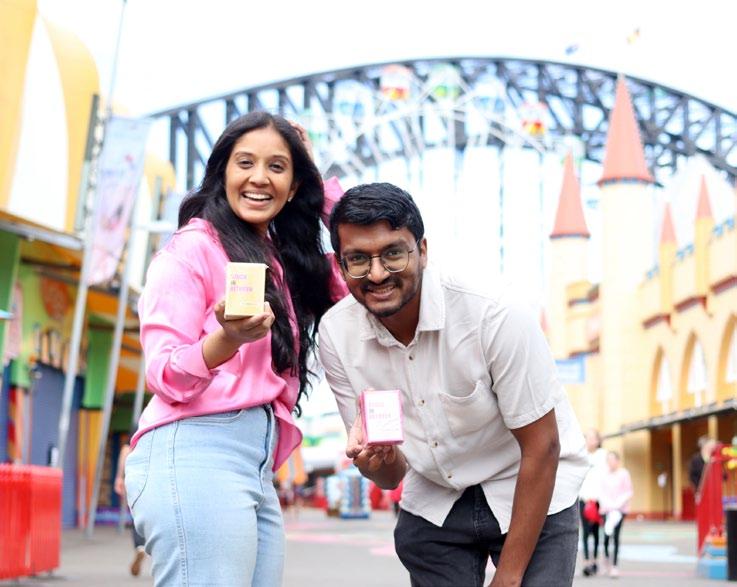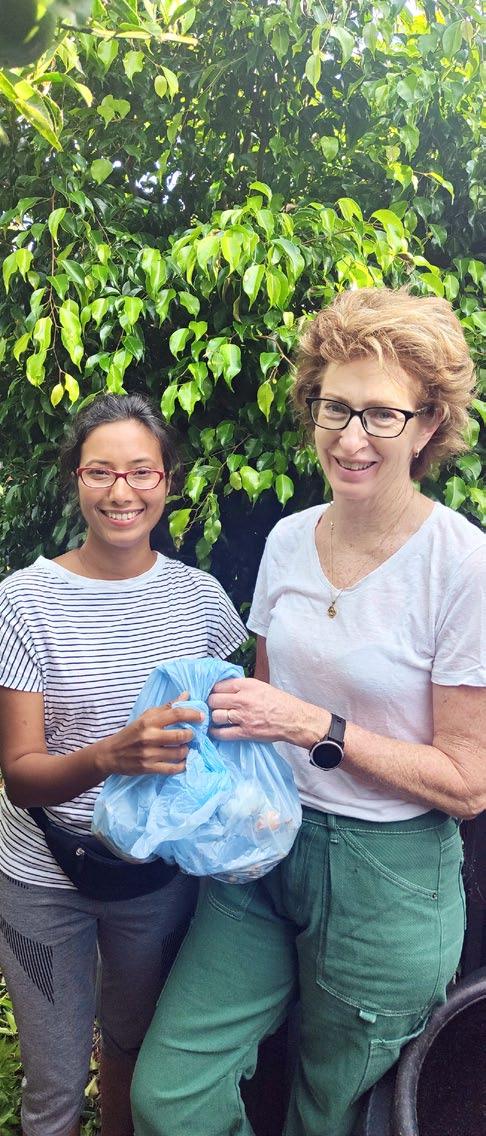
5 minute read
Aussie BBQ meets filter coffee
from 2023-04-Sydney
by Indian Link
The podcast series Stuck In Between explores the complexities of growing up navigating two different worlds
microscope and challenging what they can learn from one another, sharing and learning from diverse perspectives, and experiences and accomplishments of our community,” Senthan tells Indian Link.
The program has attracted “a killer guest list,” including comedian Neel Kolhatkar, radio presenter Avneesha Martins and playwright S Shakthidharan, among others.
In Between, she enlightens listeners about how she has expanded her business and ventured into publishing children's books that share stories, histories and mythologies of Indigenous communities and communities of colour.
Romitha and Senthan are both in their late 20s. Romitha is originally from Sri Lanka, and moved to Australia when she was six years old. Senthan was born in the United States and migrated to Australia when he was just three.

They met some 10 years ago as first year students at university.
“It wasn't until our final year though, when we reconnected for a student-run cultural group,” Senthanshares.
The idea of Stuck In Between came to them when they were comfortable in corporate jobs but were itching to enter the creative sphere.
“Senthan is really good at facilitating conversations,” admits Romitha. “So while recovering from an existential crisis triggered by the 2020 lockdown, I formulated the initial idea and asked Senthan if he’d be interested in starting a podcast.”
Unlike other friends-run podcast shows that may engage in filler conversations, Romitha and Senthan keep their conversations crisp, sharp and fun.
The biggest reward for the hosts though, is the encouraging feedback they receive from their audience.
Two Tamilians walk into a bar. One likes to ask questions, and the other loves to talk. And just like that, a podcast is born!
Long-time friends Romitha Seher and Senthan Sanchayan are hosts of Stuck In Between, a podcast that talks about their South Asian roots and Aussie upbringing. The crossover of differences and commonalities between their native and adopted heritage meant there was always a lot to discuss and talk about.

“The show is about trying to make more sense of the two cultures, putting both our Eastern and Western cultures under a
“A big part of the Stuck In Between experience centres on juggling differing value sets - the individualistic view prevalent in the West, compared to the focus on collectivism in the East,” Romitha points out.
When the idea first came up, there weren't a lot of South Asian Australian voices in the space.
Today the podcast is two series old, with 25K+ downloads, and a third series has just dropped.
“We’ve had the opportunity to build special relationships with some incredibly inspiring people and it’s been a privilege to share and learn from so many important and underrepresented stories,” Senthan highlights.
“One of the more recent episodes was with Dinesh Palipana, who is a doctor, disability advocate, author and speaker,” says Romitha when asked to pick a favourite. “Hearing how Dinesh overcame the trauma of a car accident that left him quadriplegic and how he didn’t allow his circumstances to get in the way of chasing his wildest dreams – publishing a book, sky diving, driving race cars, being a runway model – was a touching conversation about resilience and purpose.”
Entrepreneur Luckshmi Nirmalananda, who has featured in two episodes, is this writer's favourite. Luckshmi is the founder of The Heritage Supply Co, which aims to connect people to their heritage through toys, books and education tools. On Stuck
“Our episodes have resonated with [our listeners] and helped make sense of something they’ve been working through,” shares Romila, encapsulating why their show continues to be so successful.

It’s 5:00 pm Sunday evening… time for wrapping my weekly gift. It is a gift of the week’s rubbish.
This wasteful present is for my neighbour down the street, who is very happy to receive it.
Now, before you raise your eyebrows in distaste, let me tell you, this gift is biodegradable kitchen waste, and my neighbour Maureen is a composter.
I would love to be a composter myself, but since I live in an apartment, space is a constraint. And so, cue technology: apps like Sharewaste help people like me connect with composters in the neighbourhood.
Before I began doing this, a feeling of guilt would routinely come over me every time I packed organic waste into bin bags along with other nondegradable waste. Not only because I was aware that organic waste deserves to be given back to nature, but also because I knew once it goes to landfill, it would remain inside my packed bin bag, decomposing anaerobically and contributing to greenhouse gases, adding to climate change.
I am thankful now for the knowledge I got from my university social project more than a decade ago, where we were taught about wet and dry garbage segregation, and how wet garbage need not go into landfills but be composted.
Did you know, in 2016-17, Australia produced 7.3 million tonnes of food waste across the supply and consumption chain?
Of this, 2.5 million tonnes (34 per cent) was created in our homes, which is more than four kilograms per household per week. Organic waste in landfills emits methane, a gas that has a global warming potential between 28 and 36 times that of carbon dioxide. So, it’s not only our cars but also our kitchens, that contribute to climate change.
Yet there is a simple way for us as individuals to ensure we are not doing further. And that is – composting.
Organic waste composting can be as easy as burying our problems. Some composters use a simple trick of burying the household garbage in a dedicated spot on the ground in their garden. Others use a composting bin and microorganisms like Bokashi powder to help them compost faster. In a matter of few months, voila, your kitchen waste disappears and reduces to natural fertilizer for the garden.
Agree, not all may be able to take up composting for various reasons, due to space constraints or lack of knowledge of composting, like me. This is where apps like Sharewaste help.
All you need is a box or bin to separate your kitchen waste, and a connection with a composter.

If you’re composting already, then it’s a great service you are doing to the environment and to the future. Getting on to such apps helps you connect faster with your compost donors. After all, we all want our children to have a better future.

As you may have experienced, Australia is going through climate change already with changes to rainfall patterns, and increased extreme weather events like floods and bushfires. Across the world too, there are higher than average temperatures, melting glaciers and rising sea levels. Imagine how this will change in our children’s future.
If there’s anything we can do to gift them a better environment, it’s disposing our kitchen waste correctly. In the process of organic waste composting, kids and family members also become aware of the environment and their responsibility towards it. (The activity of collecting kitchen waste separately from the other waste will invoke a sense of being a Captain Planeteer, with Earth as the superpower.)
So, what are you doing about your child’s future besides giving them beautiful experiences, saving up for their education or their big day? Which day of the week are you going to set aside to take your organic waste out?







